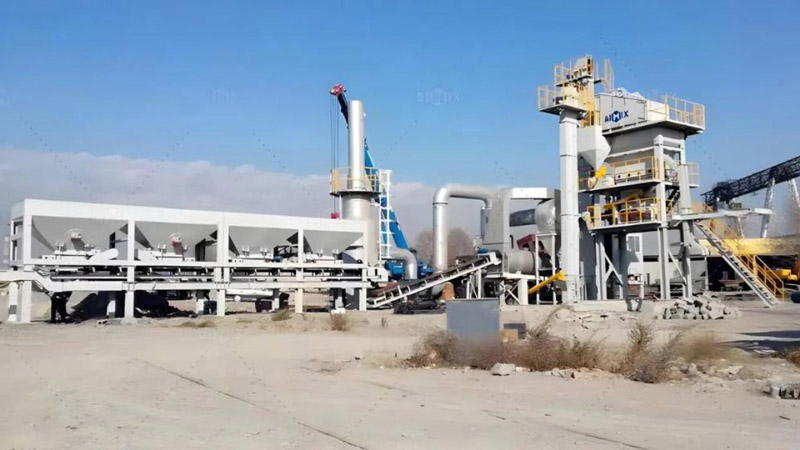The Value of Mobile Asphalt Mixing Plants in Rural Road Construction in Latin America
Rural road development is one of the most pressing infrastructure needs in Latin America. Many communities in countries like Peru, Colombia, and Brazil rely on roads to connect farms, schools, healthcare services, and markets. However, constructing these roads often presents logistical and financial challenges due to scattered locations and limited budgets. In this context, the mobile asphalt plant has emerged as a practical and cost-effective solution. Its flexibility, lower operating costs, and ability to produce asphalt directly at the construction site make it an ideal choice for rural road projects across the region.
Why Rural Roads Are Vital for Latin America
Rural roads are more than just transportation links; they are lifelines that connect isolated communities to broader economic opportunities. For agricultural producers, reliable roads mean faster access to markets. For families, they improve access to healthcare and education. Governments across Latin America have recognized these benefits, leading to an increasing number of road improvement programs targeting rural areas.
Yet, traditional methods of road construction, which often rely on centralized stationary plants, struggle to meet these needs efficiently. Transporting asphalt over long distances to remote areas not only raises costs but also reduces mix quality, as asphalt cools during transit. This is where mobile asphalt plants(planta asfaltica movil) provide a distinct advantage.

The Role of Mobile Asphalt Plants in Rural Road Projects
Flexibility in Remote Locations
The ability of a mobile asphalt plant to relocate easily makes it a natural fit for rural projects. Many road construction sites in Latin America are far from urban centers, and moving equipment close to these locations is essential. Unlike stationary plants, which are fixed to one location, mobile units can be set up quickly near rural projects, ensuring fresh asphalt supply and reducing hauling time.
Lower Costs and Improved Efficiency
For contractors, cost control is a critical factor in bidding for government contracts or private rural development projects. A mobile asphalt plant significantly reduces transportation expenses by producing asphalt on-site. Additionally, its faster setup time means less downtime and more efficient use of resources. The overall result is lower project costs without sacrificing quality.
Adaptability to Small and Medium-Scale Projects
Most rural road construction projects are smaller in scale compared to highways or urban expressways. A mobile asphalt plant, with its moderate production capacity, aligns perfectly with these needs. It can handle varying project sizes while maintaining consistent quality standards, making it a versatile investment for contractors working across multiple rural regions.
Comparing Mobile Plants With Drum Mix Asphalt Plants
When analyzing the types of asphalt production equipment, both mobile plants and the drum mix asphalt plant offer unique advantages. A drum mix asphalt plant(planta de asfalto continua) operates continuously, producing asphalt in a single drum without interruption. This makes it suitable for projects where a steady supply of asphalt is required, such as longer stretches of rural roads.
Mobile asphalt plants, on the other hand, provide the mobility that rural projects demand. In fact, some mobile units are designed with drum mix configurations, combining continuous production with portability. This hybrid approach ensures contractors benefit from both consistent output and the ability to move equipment easily between dispersed rural sites.
Key Benefits for Rural Communities
Faster Project Delivery
Because mobile asphalt plants reduce setup and transport delays, rural road projects can be completed more quickly. This not only benefits contractors but also helps communities gain access to improved roads sooner, enhancing connectivity and local development.
Better Road Quality
Producing asphalt closer to the construction site ensures better temperature control and material consistency. This leads to higher-quality roads that last longer, reducing the need for frequent repairs and saving governments money in the long run.
Sustainable Development
By minimizing transport distances and fuel consumption, mobile asphalt plants also contribute to sustainability goals. In rural Latin America, where environmental concerns are increasingly important, this advantage supports both economic and ecological priorities.
Case Scenarios in Latin America
In Peru, rural road improvement programs are vital for connecting mountainous villages to regional hubs. A mobile asphalt plant can be set up in these areas, eliminating the inefficiencies of transporting asphalt from cities. Similarly, in Brazil, agricultural regions require reliable roads to move produce efficiently. Here, mobile and drum mix asphalt plant options provide a balance between cost savings and production capacity.
In Colombia, where rural development is a government priority, mobile plants allow contractors to participate in multiple small projects without the financial burden of moving heavy stationary equipment. This flexibility expands opportunities for both local businesses and national infrastructure development.
Conclusion
The value of mobile asphalt mixing plants in rural road construction across Latin America is clear. By addressing the challenges of distance, cost, and project scale, these plants enable contractors to deliver high-quality roads more efficiently. Whether through direct mobility or integration with continuous production models like the drum mix asphalt plant, mobile units are transforming the way rural infrastructure projects are carried out. For governments, contractors, and communities alike, mobile asphalt plants are more than just machines—they are essential tools for building stronger connections and supporting sustainable development in Latin America’s rural regions.
Subscribe to unlock premium content
Sed at tellus, pharetra lacus, aenean risus non nisl ultricies commodo diam aliquet arcu enim eu leo porttitor habitasse adipiscing porttitor varius ultricies facilisis viverra lacus neque.



